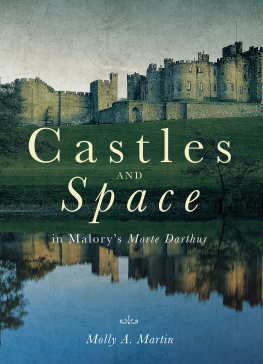CONTENTS
INTRODUCTION
Among the stories of world-wide renown, not the least stirring are those that have gathered about the names of national heroes. The neid, the Nibelungenlied, the Chanson de Roland, the Morte D'Arthur,they are not history, but they have been as National Anthems to the races, and their magic is not yet dead.
In olden times our forefathers used to say that the world had seen nine great heroes, three heathen, three Jewish, and three Christian; among the Christian heroes was British Arthur, and of none is the fame greater. Even to the present day, his name lingers in many widely distant places. In the peninsula of Gower, a huge slab of rock, propped up on eleven short pillars, is still called Arthur's Stone; the lofty ridge which looks down upon Edinburgh bears the name of Arthur's Seat; andstrangest, perhaps, of allin the Franciscan Church of far-away Innsbrck, the finest of the ten statues of ancestors guarding the tomb of the Emperor Maximilian I. is that of King Arthur. There is hardly a country in Europe without its tales of the Warrior-King; and yet of any real Arthur history tells us little, and that little describes, not the knightly conqueror, but the king of a broken people, struggling for very life.
More than fifteen centuries ago, this country, now called England, was inhabited by a Celtic race known as the Britons, a warlike people, divided into numerous tribes constantly at war with each other. But in the first century of the Christian era they were conquered by the Romans, who added Britain to their vast empire and held it against attacks from without and rebellions from within by stationing legions, or troops of soldiers, in strongly fortified places all over the country. Now, from their conquerors, the Britons learnt many useful arts, to read and to write, to build houses and to make roads; but at the same time, they unlearnt some of their own virtues and, among others, how to think and act for themselves. For the Romans never allowed a Briton any real part in the government of his own country, and if he wished to become a soldier, he was sent away from Britain to serve with a legion stationed in some far-distant part of the empire. Thus it came about that when, in the fifth century, the Romans withdrew from Britain to defend Rome itself from invading hordes of savages, the unhappy Britons had forgotten how to govern and how to defend themselves, and fell an easy prey to the many enemies waiting to pounce on their defenceless country. Picts from Scotland invaded the north, and Scots from Ireland plundered the west; worst of all, the heathen Angles and Saxons, pouring across the seas from their homes in the Elbe country, wasted the land with fire and sword. Many of the Britons were slain; those who escaped sought refuge in the mountainous parts of the west from Cornwall to the Firth of Clyde. There, forgetting, to some extent, their quarrels, they took the name of the Cymry, which means the "Brethren," though the English, unable to understand their language, spoke of them contemptuously as the "Welsh," or the "Strangers."
For a long time the struggle went on between the two races, and nowhere mere fiercely than in the south-west, where the invaders set up the Kingdom of Wessex; but at last there arose among the Britons a great chieftain called Arthur. The old histories speak of him as "Emperor," and he seems to have been obeyed by all the Britons; perhaps, therefore, he had succeeded to the position of the Roman official known as the Comes Britanni, whose duty it was to hasten to the aid of the local governors in defending any part of Britain where danger threatened. At all events, under his leadership, the oppressed people defeated the Saxons in a desperate fight at Mons Badonicus, perhaps the little place in Dorsetshire known as Badbury, or, it may be, Bath itself, which is still called Badon by the Welsh. After that victory, history has little to say about Arthur. The stories tell that he was killed in a great battle in the west; but, nowadays, the wisest historians think it more probable that he met his death in a conflict near the River Forth.
And so, in history, Arthur, the hero of such a mass of romantic story, is little more than a name, and it is hardly possible to explain how he attained to such renown as the hero of marvellous and, sometimes, magical feats, unless on the supposition that he became confused with some legendary hero, half god, half man, whose fame he added to his own. Perhaps not the least marvel about him is that he who was the hero of the Britons, should have become the national hero of the English race that he spent his life in fighting. Yet that is what did happen, though not till long afterwards, when the victorious English, in their turn, bent before their conquering kinsmen, the Normans.
Now in the reign of the third Norman king, Henry I., there lived a certain Welsh priest known as Geoffrey of Monmouth. Geoffrey seems to have been much about the Court, and perhaps it was the Norman love of stories that first made him think of writing his History of the British Kings. A wonderful tale he told of all the British kings from the time that Brut the Trojan settled in the country and called it, after himself, Britain! For Geoffrey's book was history only in name. What he tells us is that he was given an ancient chronicle found in Brittany, and was asked to translate it from Welsh into the better known language, Latin. It is hardly likely, however, that Geoffrey himself expected his statement to be taken quite seriously. Even in his own day, not every one believed in him, for a certain Yorkshire monk declared that the historian had "lied saucily and shamelessly"; and some years later, Gerald the Welshman tells of a man who had intercourse with devils, from whose sway, however, he could be freed if a Bible were placed upon his breast, whereas he was completely under their control if Geoffrey's History were laid upon him, just because the book was so full of lies.
It is quite certain that Geoffrey did not write history, but he did make a capital story, partly by collecting legends about British heroes, partly by inventing stories of his own; so that though he is not entitled to fame as an historian, he may claim to rank high as a romantic story-teller who set a fashion destined to last for some three centuries.
So popular was his book that, not only in England, but, in an even greater degree, on the Continent, writers were soon at work, collecting and making more stories about the greatest of his kings, Arthur. By some it is thought that the Normans took such delight in the knightly deeds of Geoffrey's heroes that they spread the story in France when they visited their homes in Normandy. Moreover, they were in a good position to learn other tales of their favourite knights, for Normandy bordered on Brittany, the home of the Bretons, who, being of the same race as the Welsh, honoured the same heroes in their legends. So in return for Geoffrey's tales, Breton stories, perhaps, found their way into England; at all events, marvellous romances of King Arthur and his Round Table were soon being told in England, in France, in Germany and in Italy.











